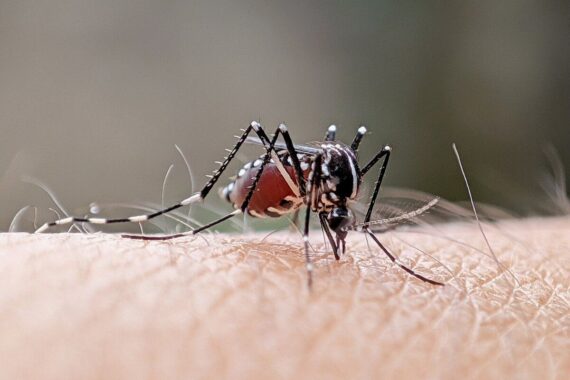Heat-related deaths are estimated to increase by one and a half times in the 2030s, while mosquito-borne diseases are also likely to come to the UK in the ‘near future’.
These are stark warnings featured in today’s UKHSA report on the effects of climate change – the first of its kind since 2012.
Threats from heat, mosquitos, flooding and food security will become ‘more significant in the near future’, public health officials warn.
The report examined the future relationship between temperature and mortality in climate change and warned that using a ‘high-emissions scenario’, UK-heat related deaths are estimated to increase by one and a half times in the 2030s and by 12 times by 2070.
The authors said that many infectious diseases are ‘highly climate sensitive’, and with warmer temperatures ‘it is increasingly likely’ that we will see the introduction and establishment of a number of invasive mosquito species in the UK, as well as the projected spread of existing species into habitats that were previously inhospitable to them.
UKHSA also said that climate modelling under a high-emissions scenario suggests that Aedes albopictus – a mosquito species that can transmit dengue fever, chikungunya virus and zika virus – ‘has the potential to become established’ in most of England by the 2040s and 2050s while most of Wales, Northern Ireland and parts of the Scottish Lowlands ‘could also become suitable habitats’ later on in the century.
Under this scenario, London could experience endemic dengue transmission by 2060, the authors warned, adding that the risk of establishment of Aedes albopictus in the UK ‘is of great concern for public health’.
Under the same scenario, cold-related deaths are also projected to increase before declining, with deaths from extreme cold declining by the mid-century, and deaths from moderate cold peaking around the same time and seeing a decline by the 2070s.
The report also added that many of the anticipated adverse health impacts of climate change in the UK ‘are still avoidable’ through climate change mitigation and others ‘are preventable at lower levels of warming through effective adaptation’.
Dr Lea Berrang Ford, head of centre for climate and health security at UKHSA, said: ‘The evidence is clear – climate change is not solely a future health threat. Health impacts are already being felt domestically and globally, and these risks will accelerate.
‘Temperatures will likely continue to increase until at least mid- century irrespective of the amount by which we decarbonise in the decades to come.
‘Many current working age adults will be over 65 years and potentially highly vulnerable to the health impacts of increased temperatures.
‘A child born today will be in their working age years when health impacts may peak or accelerate further, depending on how much we decarbonise now.”
‘There are significant opportunities for win-win solutions that can combat climate change and improve health.
‘The health decisions we make today will determine the severity and extent of climate impacts inherited by today’s youth and their children.’
Last week, UKHSA said it would ‘increase surveillance’ at GP surgeries in North Yorkshire after new strain of swine flu was detected in humans for the first time in the UK.
In July, it warned that unless MMR vaccination rates improved, London could see a measles outbreak ‘with tens of thousands of cases’.

















